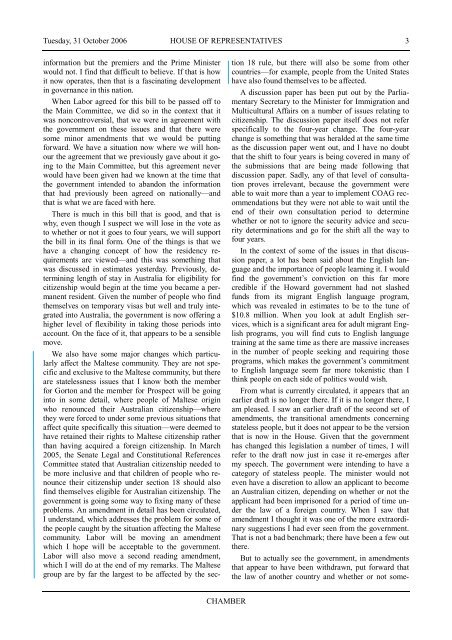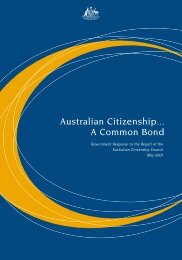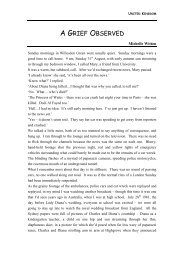HOUSE OF REPRESENTATIVES - The Southern Cross Group
HOUSE OF REPRESENTATIVES - The Southern Cross Group
HOUSE OF REPRESENTATIVES - The Southern Cross Group
Create successful ePaper yourself
Turn your PDF publications into a flip-book with our unique Google optimized e-Paper software.
Tuesday, 31 October 2006 <strong>HOUSE</strong> <strong>OF</strong> <strong>REPRESENTATIVES</strong> 3<br />
information but the premiers and the Prime Minister<br />
would not. I find that difficult to believe. If that is how<br />
it now operates, then that is a fascinating development<br />
in governance in this nation.<br />
When Labor agreed for this bill to be passed off to<br />
the Main Committee, we did so in the context that it<br />
was noncontroversial, that we were in agreement with<br />
the government on these issues and that there were<br />
some minor amendments that we would be putting<br />
forward. We have a situation now where we will honour<br />
the agreement that we previously gave about it going<br />
to the Main Committee, but this agreement never<br />
would have been given had we known at the time that<br />
the government intended to abandon the information<br />
that had previously been agreed on nationally—and<br />
that is what we are faced with here.<br />
<strong>The</strong>re is much in this bill that is good, and that is<br />
why, even though I suspect we will lose in the vote as<br />
to whether or not it goes to four years, we will support<br />
the bill in its final form. One of the things is that we<br />
have a changing concept of how the residency requirements<br />
are viewed—and this was something that<br />
was discussed in estimates yesterday. Previously, determining<br />
length of stay in Australia for eligibility for<br />
citizenship would begin at the time you became a permanent<br />
resident. Given the number of people who find<br />
themselves on temporary visas but well and truly integrated<br />
into Australia, the government is now offering a<br />
higher level of flexibility in taking those periods into<br />
account. On the face of it, that appears to be a sensible<br />
move.<br />
We also have some major changes which particularly<br />
affect the Maltese community. <strong>The</strong>y are not specific<br />
and exclusive to the Maltese community, but there<br />
are statelessness issues that I know both the member<br />
for Gorton and the member for Prospect will be going<br />
into in some detail, where people of Maltese origin<br />
who renounced their Australian citizenship—where<br />
they were forced to under some previous situations that<br />
affect quite specifically this situation—were deemed to<br />
have retained their rights to Maltese citizenship rather<br />
than having acquired a foreign citizenship. In March<br />
2005, the Senate Legal and Constitutional References<br />
Committee stated that Australian citizenship needed to<br />
be more inclusive and that children of people who renounce<br />
their citizenship under section 18 should also<br />
find themselves eligible for Australian citizenship. <strong>The</strong><br />
government is going some way to fixing many of these<br />
problems. An amendment in detail has been circulated,<br />
I understand, which addresses the problem for some of<br />
the people caught by the situation affecting the Maltese<br />
community. Labor will be moving an amendment<br />
which I hope will be acceptable to the government.<br />
Labor will also move a second reading amendment,<br />
which I will do at the end of my remarks. <strong>The</strong> Maltese<br />
group are by far the largest to be affected by the sec-<br />
CHAMBER<br />
tion 18 rule, but there will also be some from other<br />
countries—for example, people from the United States<br />
have also found themselves to be affected.<br />
A discussion paper has been put out by the Parliamentary<br />
Secretary to the Minister for Immigration and<br />
Multicultural Affairs on a number of issues relating to<br />
citizenship. <strong>The</strong> discussion paper itself does not refer<br />
specifically to the four-year change. <strong>The</strong> four-year<br />
change is something that was heralded at the same time<br />
as the discussion paper went out, and I have no doubt<br />
that the shift to four years is being covered in many of<br />
the submissions that are being made following that<br />
discussion paper. Sadly, any of that level of consultation<br />
proves irrelevant, because the government were<br />
able to wait more than a year to implement COAG recommendations<br />
but they were not able to wait until the<br />
end of their own consultation period to determine<br />
whether or not to ignore the security advice and security<br />
determinations and go for the shift all the way to<br />
four years.<br />
In the context of some of the issues in that discussion<br />
paper, a lot has been said about the English language<br />
and the importance of people learning it. I would<br />
find the government’s conviction on this far more<br />
credible if the Howard government had not slashed<br />
funds from its migrant English language program,<br />
which was revealed in estimates to be to the tune of<br />
$10.8 million. When you look at adult English services,<br />
which is a significant area for adult migrant English<br />
programs, you will find cuts to English language<br />
training at the same time as there are massive increases<br />
in the number of people seeking and requiring those<br />
programs, which makes the government’s commitment<br />
to English language seem far more tokenistic than I<br />
think people on each side of politics would wish.<br />
From what is currently circulated, it appears that an<br />
earlier draft is no longer there. If it is no longer there, I<br />
am pleased. I saw an earlier draft of the second set of<br />
amendments, the transitional amendments concerning<br />
stateless people, but it does not appear to be the version<br />
that is now in the House. Given that the government<br />
has changed this legislation a number of times, I will<br />
refer to the draft now just in case it re-emerges after<br />
my speech. <strong>The</strong> government were intending to have a<br />
category of stateless people. <strong>The</strong> minister would not<br />
even have a discretion to allow an applicant to become<br />
an Australian citizen, depending on whether or not the<br />
applicant had been imprisoned for a period of time under<br />
the law of a foreign country. When I saw that<br />
amendment I thought it was one of the more extraordinary<br />
suggestions I had ever seen from the government.<br />
That is not a bad benchmark; there have been a few out<br />
there.<br />
But to actually see the government, in amendments<br />
that appear to have been withdrawn, put forward that<br />
the law of another country and whether or not some-




